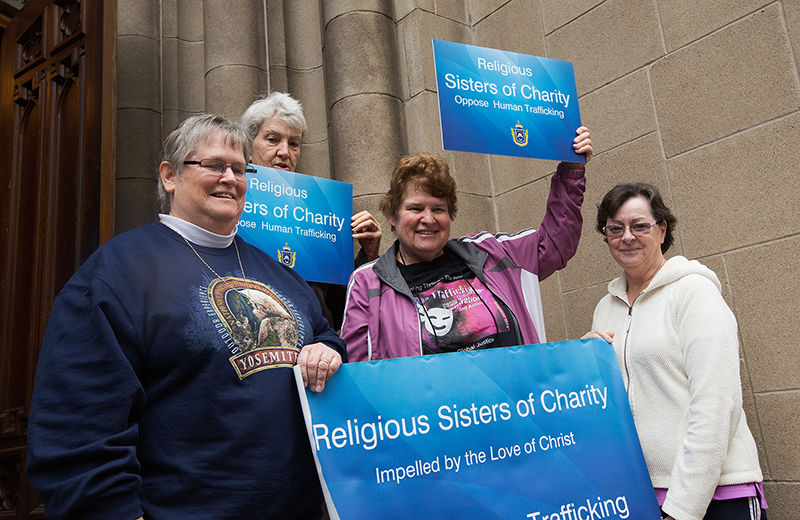On Jan. 16, families, high school students and human trafficking survivors marched in protest of labor and sex trafficking. The roughly 500 activists held signs and chanted as they walked through Koreatown, a Los Angeles neighborhood known for cases of human trafficking.
Presented by the Coalition to Abolish Slavery and Trafficking (CAST), the annual LA Freedom Walk is a collaborative effort between many faith groups. “We will never stop coming,” Elizabeth Alvarez, a long-time participant in the annual march, told the The Tidings. As a mother, she said she understands the importance of staying aware of potential dangers. She knows of two girls that narrowly escaped being kidnapped after successfully fighting to free themselves from three men who had dragged them into a car in her Boyle Heights neighborhood.
“Our beautiful girls and boys are disappearing,” she said. “We have to stop this.” Her 11-year-old daughter Samantha, who also participated in the march, said she felt “upset and sad” about her lack of freedom to walk places on her own, but, after attending the event, she said she understands her mother’s concerns.
An estimated 30 million people are living in slavery around the world, according to a United Nations report, with Los Angeles being the top destination for human trafficking in the U.S. Labor and sex slaves in the U.S. are estimated in the tens of thousands. “Traffickers often exert control over victims by tearing down their self-esteem, saying that nobody cares whether they live or die,” said Kay Buck, executive director of CAST. “The Freedom Walk sends a very different message: the people of Los Angeles do care.”
Sister Kathleen Bryant, RSC, an organizer for the event, said the march is an important way to raise awareness. “I love being involved in the neighborhood civic issues to use our voices to fight an injustice,” she said.
Two survivors spoke before the march. Nola Brantley, one of the nation’s leading advocate for victims of sex trafficking, and Kanthi Salgadu, labor trafficking survivor and activist, spoke on the importance of community awareness and actively working to end trafficking.
“I want to speak about the power of collective activism this morning,” Brantley told those gathered at Immanuel Presbyterian Church. “Ten years ago I wouldn’t feel confident speaking about collective activism on this issue because we weren’t in that place as a society.”
Brantley credits the activism of survivors who petitioned legislators for the growing awareness and better laws against human trafficking.
“For 10 to 20 years advocates and survivors have been hard core advocating around this issue, so [after] 10 to 20 years you start to build momentum,” she said.
Still, Brantley said, more people have to actively petition for change. She encourages everyone to show up at local protest marches, write letters to state legislators and watch out for people that are preyed upon by traffickers.
Many traffickers prey on victims of family sexual abuse, poverty and violence, she said, noting that these factors in her upbringing made her vulnerable.
“This is about desperate people in our society,” she said.
She urged the protesters to not neglect someone because they seem different. “Make that connection,” she said.
Brantley has worked with more than 1,000 child victims of sex trafficking. Part of her expertise is training others to identify and work with these children.
“You have hopeless souls, whether they are children or adults, and they are looking for ways to escape the situation,” she said. “That journey to escape is often more hopeless situations. This is a cycle that we must interrupt.”
Part of the difficulty for victims is their struggle with feeling ashamed. A survivor can break free from that with proper support, she explained.
“I think other people are breaking free based on other survivors stepping forward and sharing their [stories],” said Brantley. “It’s giving people permission to say, ‘I don’t have to be ashamed of what happened to me either. It’s not anything that I did; it’s something that someone did to me.’”
Brantley stressed the importance of truly caring for the victims of trafficking. “Use unconditional love,” she said. “Give people eye contact. There are no ‘others’ — we are all part of the human race, and everyone has their story.”
One final step to ending human trafficking is raising money, said Brantley. “I know it’s a sensitive topic that people don’t like to talk about, but you can’t do the work without the money.”

